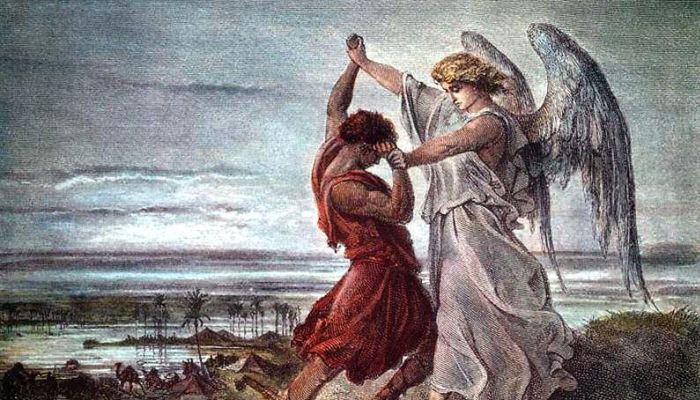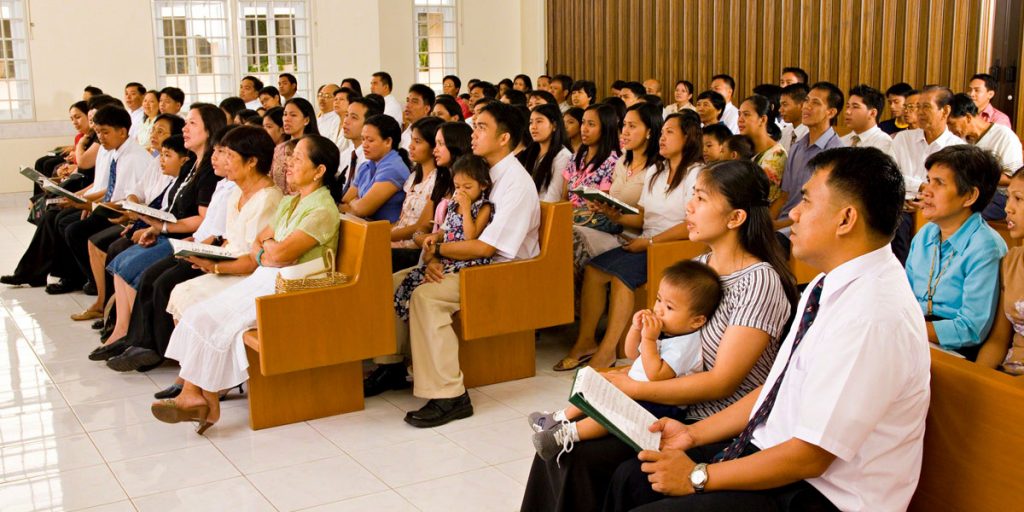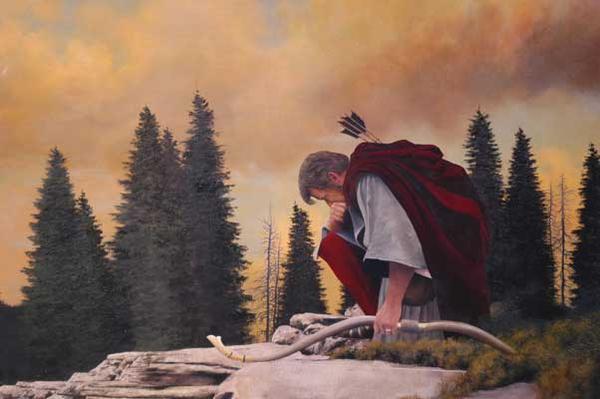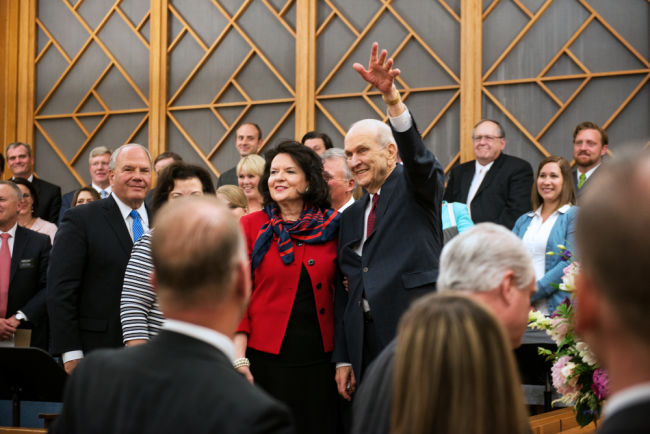
Listen to this article (30 minutes).
In his most recent General Conference address, President of The Church of Jesus Christ of Latter-day Saints, Russell M. Nelson, extended the invitation to members of the faith to “let God prevail.” President Nelsen says he has “…spoken of Israel in at least 378 of the more than 800 messages [he has] delivered during [his] 36 years as an Apostle.” President Nelson illustrates this focus perfectly when he states: “I have studied the gathering [of the children of Israel], prayed about it, feasted upon every related scripture, and asked the Lord to increase my understanding.”
In the scriptures, “Israel” can apply to Jacob’s family, or to a geographical place, or to people who are willing to let God prevail in their lives. President Nelson learned that a possible meaning for the Hebrew word “Israel” is “let God prevail.”
The overarching purpose is to help members evaluate the trajectory of their daily lives by asking them the following:
Are you willing to let God prevail in your life?
Are you willing to let God be the most important influence in your life?
This is an invitation to an all-inclusive, no-holds-barred, personal and private excavation into our own sources of motivation, of understanding, of belief, and dedication.
The story of Jacob holds keys to understanding.
Related: Believing in President Nelson’s Promises
The Call to Prepare and Become
To learn how we can be a person willing to “let God prevail” we need to take a deeper dive into Jacob’s journey of growth. When we look at the life of Jacob, the second-born twin sibling of Esau, up until he leaves Canaan to search for a wife, we see a man who has gained both Esau’s physical inheritance of his father’s wealth through what could be considered a grossly unequal bargain and who has usurped Esau’s firstborn spiritual inheritance through an equally egregious deception arranged by his own mother. His very name shows a grasping nature. According to Wikipedia, the name Jacob “comes either from the Hebrew root עקב ʿqb meaning “to follow, to be behind” but also “to supplant, circumvent, assail, overreach,” or from the word for “heel”, עֲקֵב ʿaqeb’.”
Jacob, as a younger man, is not the guy who sits back and accepts his position as second child humbly and submissively. Esau, heartbroken and weeping, exclaims: “Is not he rightly named Jacob?” (Genesis 27:36). Enraged, “Esau said in his heart, The days of mourning for my father are at hand; then will I slay my brother Jacob” (Genesis 27:41). In other words, as soon as their father Isaac is dead, Esau plans to murder Jacob for this deception.
Up to this point, Jacob is not exactly winning any awards for his nobility of character. But God sees better (and this should give us all hope in relation to our own conditions).
It’s time for Jacob to run away from home.
With the blessing of Isaac behind him, and the concern of Rebekah abounding, Jacob is charged to go to his mother’s people outside the boundaries of Canaan in search of a wife (see Genesis 28:1-20). He’ll need to start his life elsewhere—outside the promised land. And yet, the blessings associated with the Abrahamic Covenant are still secure in him and remain. Prefiguring the exile of his posterity in Egypt, Jacob crosses the Jordan river but he will return. We can see the raw edges of ourselves in Jacob’s experience thus far: imperfect, self-focused, outcast. And yet: not forgotten, guided in loneliness, planned for.
The Call to Gather
 It is on his return that we want to pause for a moment and examine. If we can see ourselves in the exile of Jacob, either in our physical or spiritual condition, then we will also be able to gain insight and instruction in Jacob’s process of restoration—his wrestle as he travels back to the promised land.
It is on his return that we want to pause for a moment and examine. If we can see ourselves in the exile of Jacob, either in our physical or spiritual condition, then we will also be able to gain insight and instruction in Jacob’s process of restoration—his wrestle as he travels back to the promised land.
Jacob has been gone for many years when he feels prompted to return to where his father lives and establish his own home back in Canaan. But his conflict with Esau was never resolved and it looms large in his mind. When he arrives at the boundary of the land at the Jordan river, he has multiple wives, a gaggle of children, and vast flocks of animals. He sends his messenger to scout out the area and this is what happens (Genesis 32: 6-9):
And the messengers returned to Jacob, saying, We came to thy brother Esau, and also he cometh to meet thee, and four hundred men with him.
Then Jacob was greatly afraid and distressed: and he divided the people that was with him, and the flocks, and herds, and the camels, into two bands;
And said, If Esau come to the one company, and smite it, then the other company which is left shall escape.
Coming home—or rather, the process of being restored—means Jacob has to make amends. It feels dangerous. It is dangerous. He’s preparing for justice. It’s not in his favor.
It is important for us to note that part of Jacob’s struggle to be restored involves a similar type of cunning and strategizing that is associated with Jacob in his earlier life. However, this time, instead of using it to take unjustly, Jacob uses it to protect his family, heal the familial rift, and return to the Promised Land. Vice is reworked into virtue. After he has done all he can think to do to be physically prepared for the worst-case scenario, he turns to God and prays, with real intent.
The next day, he gets another idea about how to increase his chances of survival. He can do more to be ready to face his threatening obstacle. He prepares a huge gift of over 330 animals for Esau and has his servants take the gift out in a series of three phases—like a wealth parade of gifts.
As a sidebar, it is interesting that Jacob would use this method. It is not unlike what a people would present to an ancient king with whom they’d just made a treaty of peace—I’m thinking of Pharaoh in Egypt who would have been very familiar with this tactic. The parade of gifts by an assimilating people shows not only goodwill but also shows the king that he has a new powerful and wealthy ally. This would increase both the safety, wealth, and security of the king.
If the king decided to go to war or had to defend himself against invading armies, he would have more resources to draw upon and one less group of people to fight. His size—both financially and militarily—would also make him more formidable and would perhaps prevent, through fear and intimidation, foreign powers from mounting an attack. It’s good business. Now Esau is not a king, but this “language”—this gift of Jacob’s—is symbolic of Jacob’s sense of humility, of how he sees his position, and of his desire to contribute, not take.
By the end of the day, Jacob has had his servants deliver his gifts, he has split his family apart and sent them to opposite areas, and he is alone that evening anticipating a battle when the sun rises. He has acted, prayed, acted, and begins the second night with prayer again:
And Jacob was left alone; and there wrestled a man with him until the breaking of the day.
And when he saw that he prevailed not against him, he touched the hollow of his thigh; and the hollow of Jacob’s thigh was out of joint, as he wrestled with him.
And he said, Let me go, for the day breaketh. And he said, I will not let thee go, except thou bless me.
And he said unto him, What is thy name? And he said, Jacob.
And he said, Thy name shall be called no more Jacob, but Israel: for as a prince hast thou power with God and with men, and hast prevailed.
And Jacob called the name of the place Peniel: for I have seen God face to face, and my life is preserved (Genesis 32:24-30).
It’s here that Jacob proves his determination to obey the command to return. As a reward for his faithful determination, he’s given a new name: Israel. Jeff A. Benner, writing for the online site Ancient Hebrew Research Center clarifies that, “The name ‘Israel’ is actually a complete sentence in one word. The name has three components – Y, SR, and AL. He breaks it down like this:
“Y” is a prefix meaning “he”
“AL” usually pronounced as “el” is the Hebrew word for “God”
“SR” literally means “turn the head.” It is often translated as “prince” or “ruler,” one who turns the head of the people. OR
“SR” is (also) yasar meaning “discipline”. When you discipline your children you are turning their head from a path of bad to a path of good.
“SR” we know that this is a verb and not a noun (this is standard Hebrew grammar) and can literally be translated as “he turns the head of God.”
In summary, Benner interprets ‘Israel’ as encompassing the ideal, “that when Israel (either Jacob or his descendants) speaks to God, God, the father of Israel, stops what he is doing and turns to his son and says ‘What do you want my son’?” When we add this meaning to the additional interpretation “let God prevail” we see a covenant form.
The name of “Israel” is the covenant. Jacob has proven his discipleship and lives in such a way as to let God be the most important influence in his life. Jacob will therefore stop whatever he is doing when God calls on him–no matter the cost, danger, or inconvenience. And God, conversely and equally, stops whatever He is doing and answers the call of His faithful child in need. This is what it means to be of the spiritual “House of Israel”—to grow to be this kind of person.
There are some questions that linger coming out of reading this text, however. How did Jacob secure this promise? Who exactly is Jacob wrestling? Is it the Savior, a heavenly angel, a demonic angel? What does ‘wrestling’ mean in this context? Is it physical, emotional, spiritual, all three? What does this mean for us? And maybe most importantly, how do we get to this point in our lives? I believe the answer, at least in part, lies in the “wrestle.”
Judaism, Islam, and modern Christianity interpret this wrestling match differently. There is a simple synopsis of these separate interpretations on wikipedia.org if you’ll search ‘Jacob wrestling with an angel.’ I’m indebted to Gale Boyd who has a much deeper understanding of Hebraic teachings and customs who explained that Jacob was wrestling with God in order to secure a covenant of assurance that he would have his calling and election made sure. This includes the touching of the inner thigh as a sign of a binding covenant between two people which practice is still in use today and which also governs Jewish dietary customs regarding the thigh meat or rather the hamstring found in the thigh of animals which is forbidden to eat as a token of this covenant.
In addition to this, members of The Church of Jesus Christ of Latter-day Saints have a second witness of Jesus Christ in the Book of Mormon that teaches further about the nature of our “wrestle with God.” There are precedents in the stories of Enos and Alma the younger who also wrestled and which give valuable insights to aid both the interpretation of this idea and of its application to ourselves.
Related: Your Hero’s Journey Can Be a Great Adventure
The Wrestle
 There are four stories that seem to me to illustrate well what it means to wrestle in spiritual matters for both temporal or spiritual concerns. I will focus on one story in particular and will invite you to ponder the others privately. They’re all instructive and shed light on how righteous—though imperfect—people struggle to know God and to secure their own spiritual restoration. I might note that what I call a spiritual restoration is also referred to scripturally as a spiritual rebirth: the call or invitation from the Savior to return to the Promised Land or rather to the presence of God. The story we will focus on together is of Enos, grandson of Nephi, son of Jacob in The Book of Mormon in Enos 1:1-12. In studying this example we need to keep these primary questions in mind: How is his ‘wrestle’ similar to Jacob’s? Who does he wrestle? Why is he wrestling? What is the result?
There are four stories that seem to me to illustrate well what it means to wrestle in spiritual matters for both temporal or spiritual concerns. I will focus on one story in particular and will invite you to ponder the others privately. They’re all instructive and shed light on how righteous—though imperfect—people struggle to know God and to secure their own spiritual restoration. I might note that what I call a spiritual restoration is also referred to scripturally as a spiritual rebirth: the call or invitation from the Savior to return to the Promised Land or rather to the presence of God. The story we will focus on together is of Enos, grandson of Nephi, son of Jacob in The Book of Mormon in Enos 1:1-12. In studying this example we need to keep these primary questions in mind: How is his ‘wrestle’ similar to Jacob’s? Who does he wrestle? Why is he wrestling? What is the result?
Let’s take a look at Enos’ struggle:
Behold, it came to pass that I, Enos, knowing my father that he was a just man—for he taught me in his language, and also in the nurture and admonition of the Lord—and blessed be the name of my God for it—
And I will tell you of the wrestle which I had before God, before I received a remission of my sins.
Behold, I went to hunt beasts in the forests; and the words which I had often heard my father speak concerning eternal life, and the joy of the saints, sunk deep into my heart.
And my soul hungered; and I kneeled down before my Maker, and I cried unto him in mighty prayer and supplication for mine own soul; and all the day long did I cry unto him; yea, and when the night came I did still raise my voice high that it reached the heavens.
We don’t know a lot about Enos but there are some important pieces we can discern based on his statements thus far and based on the traditions of Nephi’s family. We know that the plates are passed from father to son and that the sacred responsibility of not only keeping them safe but keeping them current has fallen into the hands of Enos. We can surmise that Enos feels the weight of this responsibility and is struggling to feel a sense of worthiness.
He honors his father who has blessed him with two endowments 1.) of secular knowledge based on Jacob’s comment about learning the “language” which we know includes both oral Hebrew and written reformed Egyptian (Mormon 9:32-33), and 2.) of spiritual understanding as evidenced by his grasping both the commandments or “admonition[s] of the Lord” and of God’s merciful nature having gained a sense of God’s capacity to “nurture.” Though he’s not resentful of his upbringing—he’s grateful—you can almost hear his insecurity. Perhaps he doesn’t feel he can measure up. After all, Nephi and Jacob both had personal visitations from Christ (2 Nephi 11:2-3). Those are big shoes to fill.
He probably was content and heavily occupied in providing for his family, building his community for greater prosperity and security, and of course dealing with warring Lamanite invasions, as needed. Certainly, he didn’t feel worthy or prepared for this call—this is why he was wrestling. Finding solace in hunting—away from family, work, society, worldly pressures—he had time to think and face the prick of this burden, this role of spiritual perpetuation. Am I worthy? Am I capable? I’m not my father; I’m not my grandfather! I’m just me and I’m weak. This is a wrestle we are all familiar with to one degree or another, but there is hope.
In his wrestling, Enos receives a clear and comforting answer:
And there came a voice unto me, saying: Enos, thy sins are forgiven thee, and thou shalt be blessed.
And I, Enos, knew that God could not lie; wherefore, my guilt was swept away.
And I said: Lord, how is it done?
And he said unto me: Because of thy faith in Christ, whom thou hast never before heard nor seen. And many years pass away before he shall manifest himself in the flesh; wherefore, go to, thy faith hath made thee whole.
The result of Enos’ wrestle is clarity, forgiveness, peace. So much so that he’s taken aback. It seems clear from his surprise, “Lord, how is it done?” that this is beyond anything he expects to feel or experience. Like Jacob, Enos doesn’t leave his wilderness until he receives a witness. Through their struggle, both men find courage to return to the callings of their times and seasons. With this taste of hope fresh in his heart, Enos keeps asking:
Now, it came to pass that when I had heard these words I began to feel a desire for the welfare of my brethren, the Nephites; wherefore, I did pour out my whole soul unto God for them.
And while I was thus struggling in the spirit, behold, the voice of the Lord came into my mind again, saying: I will visit thy brethren according to their diligence in keeping my commandments. I have given unto them this land, and it is a holy land; and I curse it not save it be for the cause of iniquity; wherefore, I will visit thy brethren according as I have said; and their transgressions will I bring down with sorrow upon their own heads.
And after I, Enos, had heard these words, my faith began to be unshaken in the Lord; and I prayed unto him with many long strugglings for my brethren, the Lamanites.
And it came to pass that after I had prayed and labored with all diligence, the Lord said unto me: I will grant unto thee according to thy desires, because of thy faith.
After Enos wrestles, rather, after he “crie[s] unto [God] in mighty prayer and supplication for [his] own soul,” he returns to his wrestle on behalf of his family and friends, the Nephites, praying and pleading “with all diligence.” And when his soul is satisfied on their behalf, he prays for his enemies. Again he receives comfort and counsel.
But something significant has changed in Enos. He testifies: “my faith began to be unshaken in the Lord.” To be unshaken. That’s not the same Enos who entered the forest. That’s a man who will wrestle with his faith no more. In James Strong’s Concordance of the Bible, where he indexes every word of the Bible in order to study and cross-reference ideas and definitions, he labels “wrestle” as G3823 and defines it this way:
Wrestle: to vibrate, shake; a contest between two in which each endeavors to throw the other, and which is decided when the victor is able θλίβειν καί κατέχειν (to grieve and possess) his prostrate antagonist, i. e. hold him down with his hand upon his neck (blueletterbible.org).
Applied to his own words in verse 11, we understand that Enos’s “faith began to be unshaken”—or rather, unwrestleable; unable to be wrestled—in the Lord.” No longer would insecurity, doubt, fear, or ignorance have power to “hold him down with [a] hand upon [Enos’s] neck.” He was freed and thus transformed into a man of faith, of power, of clarity, of purpose.
Besides feelings of insecurity, unworthiness, and lack of clarity, what else do we wrestle with? According to Paul, who had his own wrestle before embracing his divine calling and work, “we wrestle not against flesh and blood, but against principalities, against powers, against the rulers of the darkness of this world, against spiritual wickedness in high places” (Ephesians 6:12).
To understand Paul’s meaning and apply it to ourselves correctly, we need to understand the Greek words he uses, both their denotations and connotations.
What principalities? According to Strong’s G746 Concordance, they are ‘arche’…”the beginning of all things,” both of God, of Satan, and of man, particularly as they relate to offices or those placed in office over others—those that hold office. In Paul’s context, man’s systems of government and of order, which are at best imperfect and at worst corruptible. What does this mean? We wrestle man-made systems, organizations, governments, power structures, and any other “principalities” which have a tendency to grasp at omnipotence and deign to omniscience, having a “form of godliness”—an ‘arche’—“but denying the power thereof” (2 Timothy 3:5).
What powers? Going back to Strong’s Concordance, “powers” is cataloged as G1849 ‘exousia’: “the ability or strength with which one is endued, which he either possesses or exercises,” “choice, liberty of doing as one pleases,” “influence,” “privilege.” Meaning, we wrestle not only with power delegated to others over us, but power within ourselves to act on our own behalf or on the behalf of others as Enos demonstrates in The Book of Mormon.
Note: Two additional stories I would encourage you to read on your own in The Book of Mormon are of young Alma as a rebellious youth who is accosted by an angelic visitation in Alma 36: 5, 12-13 (1-23) and the same Alma as an older man serving a mission in Alma 8:8-16. The third story is of young Joseph Smith and the immediate events leading up to the first vision he has in Joseph Smith History 1:7-20. Each of these stories illustrates what righteous people wrestle with and how they prevail through God.
The Call to Act
 Jacob or ‘Israel,’ Enos, Alma, and Joseph show, by their struggles, their willingness to “Let God Prevail.” They wrestle with “principalities and powers” and with God’s help become “unshakable” in their faith. They secure hope and make covenants and by so doing are gathered literally and figuratively under the auspices of the Abrahamic Covenant, heirs to the promises of these forefathers and enlisted to bother gather and aid in the gathering of all who are willing to ‘let God prevail’ in their lives, too. Isaiah sees these people in a vision, those who have gathered to the Gospel standard and offer it in turn to others who also seek to ‘let God prevail’: “How beautiful upon the mountains are the feet of him that bringeth good tidings, that publisheth peace; that bringeth good tidings of good, that publisheth salvation; that saith unto Zion, Thy God reigneth! (Isaiah 52:7).”
Jacob or ‘Israel,’ Enos, Alma, and Joseph show, by their struggles, their willingness to “Let God Prevail.” They wrestle with “principalities and powers” and with God’s help become “unshakable” in their faith. They secure hope and make covenants and by so doing are gathered literally and figuratively under the auspices of the Abrahamic Covenant, heirs to the promises of these forefathers and enlisted to bother gather and aid in the gathering of all who are willing to ‘let God prevail’ in their lives, too. Isaiah sees these people in a vision, those who have gathered to the Gospel standard and offer it in turn to others who also seek to ‘let God prevail’: “How beautiful upon the mountains are the feet of him that bringeth good tidings, that publisheth peace; that bringeth good tidings of good, that publisheth salvation; that saith unto Zion, Thy God reigneth! (Isaiah 52:7).”
In his talk, President Nelson refers to this right and responsibility: “This premillennial gathering is an individual saga of expanding faith and spiritual courage for millions of people. And as members of The Church of Jesus Christ of Latter-day Saints, or ‘latter-day covenant Israel,’ we have been charged to assist the Lord with this pivotal work.”
How do we assist? President Nelson makes it clear: “When we speak of gathering Israel on both sides of the veil, we are referring, of course, to missionary, temple, and family history work. We are also referring to building faith and testimony in the hearts of those with whom we live, work, and serve. Anytime we do anything that helps anyone—on either side of the veil—to make and keep their covenants with God, we are helping to gather Israel” (emphasis added).
In the end, why does Jacob’s story matter to us? What does it mean for us?
- He is our forefather. Jacob is our forefather either by blood or by adoption and, as any faithful heir, we are asked to carry the work forward. To act in accordance with this call is to fulfill one expression of the fifth commandment to “Honour thy father and thy mother: that thy days may be long upon the land which the Lord thy God giveth thee” (Exodus 20:12). Jacob’s purposes become our own. We, like our forefather Jacob, try to live according to the responsibilities of the Abrahamic Covenant and have hope in the promised blessings of that heirship.
- Jacob models the pattern of salvation. Jacob’s story lays out the steps for our own salvation: journeying through a spiritual wilderness, facing peril, wrestling to gain spiritual rebirth and the promise of salvation, staying faithful to the covenants of rebirth, and finally entering into the promised land—to live in the presence of God forevermore.
- We are promised protection for our posterity. President Nelson says, “And what is the Lord willing to do for Israel? The Lord has pledged that He will ‘fight [our] battles, and [our] children’s battles, and our children’s children’s [battles] … to the third and fourth generation’!”
- God asks us to observe and obey. We trust Him. It’s enough.
How does this translate to my day-to-day life? President Nelson gives his counsel:
When your greatest desire is to let God prevail, to be part of Israel, so many decisions become easier. So many issues become nonissues! You know how best to groom yourself. You know what to watch and read, where to spend your time, and with whom to associate. You know what you want to accomplish. You know the kind of person you really want to become.
Now, my dear brothers and sisters, it takes both faith and courage to let God prevail. It takes persistent, rigorous spiritual work to repent and to put off the natural man through the Atonement of Jesus Christ. It takes consistent, daily effort to develop personal habits to study the gospel, to learn more about Heavenly Father and Jesus Christ, and to seek and respond to personal revelation.
Finally, we are extended a six-month invitation by the prophet as we study our scriptures. He encourages us to:
- Make a list of all that the Lord has promised He will do for covenant Israel.
- Ponder these promises.
- Talk about them with your family and friends.
- Then live and watch for these promises to be fulfilled in your own life.
Perhaps this will be our next wrestle: to obey, to “seek learning, even by study and also by faith,” (Doctrine and Covenants 88:118), to be willing. President Nelson’s promise is, “I think you will be astounded!” From what I’ve learned this far, I have been!
How are you answering President Nelson’s challenge? Tell us in the comments.
 Heather R. Butler is the wife of a busy Bishop, the mother of 5 children, a former fashion designer, a former high school English and History teacher, President of the Trust Land Council for Karl G. Maeser Preparatory Academy, and the current owner and creator of Beautiful Living Systems, Inc., a company designed to provide women access to tools which help them to learn, understand, and actualize their capacity to live a life of greater meaning, purpose, and joy through the patterns and systems of Beautiful Living. She can be contacted through her blog at www.beautifullivingsystems.com.
Heather R. Butler is the wife of a busy Bishop, the mother of 5 children, a former fashion designer, a former high school English and History teacher, President of the Trust Land Council for Karl G. Maeser Preparatory Academy, and the current owner and creator of Beautiful Living Systems, Inc., a company designed to provide women access to tools which help them to learn, understand, and actualize their capacity to live a life of greater meaning, purpose, and joy through the patterns and systems of Beautiful Living. She can be contacted through her blog at www.beautifullivingsystems.com.





